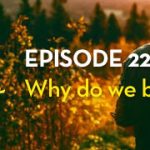What can guilt teach us?
This week Ed and I revisited the subject of guilt but from a different perspective. A listener had emailed asking for a podcast, “ I have been thinking why I can’t relax, and wonder why I feel guilty when I get the chance to”?
Guilt is one of the strangest, and least productive of human emotions. When you ask what use the habit of guilt would have been to us throughout evolution and consider why we would have developed it, it can leave you feeling at a bit of a loss. Looking at it from a psychological point of view guilt sits on both spectrums of depression and anxiety though when people describe the physical symptoms that they experience it often sounds more like anxiety. Guilt is often about what we have or not done, or wanted to do but didn’t while these all relate to past events the feeling attached to them are those of anxiety.
There are many ways of looking at guilt…
1: Guilt for something that you did
This is very often equated to sin or bad karma. I suspect that everyone reading this could look back at their life and think of things that they have done that they wish they had not. It could be the acknowledgment of mistakes made in thought, word or deed. The point is that they have passed, that ship has sailed and you cannot change what happened. All that we can change is the emotional relationship that we have to past events. We call this apology, letting go, forgiveness, repentance and so on.
If we can change our view from blaming to learning perhaps we can move on. If we look at the issues that we feel guilt about and rework them as lessons. “What did I learn?’ ‘How can I use this experience to create positive change?’ When we no longer have problems rather that we have learning opportunities we can choose to let go of guilt.
2: Guilt for something that you didn’t do
This can be a bit more difficult. Perhaps the thing that we didn’t do seriously affected other people, maybe damaged or killed them. In cases like this the need for self forgiveness and to apologise is enhanced but perhaps even more difficult. But, again we cannot change the past. We might be able to recompense those that were hurt but what we failed to do. Yet again this comes back to realising what is it that we can learn from understanding what happened.
3: Guilt for something that you didn’t do but wanted to do
I see that as the ‘If only” issue or the “Why didn’t I?” issue that can be quickly followed by the “why did I?’ issue. Over all this type of guilt is regret. Again how many of us would, if it were possible, change what we did or didn’t do. Hindsight is a clever, but often, useless thing to do unless we use it to learn so that out future behaviour and responses are different.
4: Guilt for something that you think you did
This is a good one. It is when we think we did, or might have done, but we are not really sure. Have you ever had the feeling that you might have knocked someone down on a in the dark and while you sort of know that you didn’t, you sort of feel that you did? So, you go back to the bend to check it. It is a bit like having obsessive compulsive disorder when you know that you did actually lock the door but you just need to check a few times to really convince yourself that you did. Or maybe something happened, perhaps the science lab blew up and you are not sure whether or not you did actually turn off the Bunsen burner before you left. In cases like this anxiety and guilt are running side by side. In many cases we will never truly know the answers. This is classic monkey business and needs to be dealt with on the basis that there really is nothing that you are able to do about it. Time to let go and move on.
5: Guilt that you didn’t help someone enough
Many years ago when I was about seventeen I was in Croydon in London just walking down the road. Suddenly, and literally, out of the blue a woman landed at my feet bleeding everywhere. It was so sudden and so close that I nearly stood on her. In my shock I was frozen to the spot unable to act in any way. A man came running down the road pulling off his coat and shouting to get an ambulance. He dealt with the situation. I spent a long time feeling very guilty that I had been of no use and could not respond in any way that would have been of help to the woman. I get a similar feeling when I pass homeless people and even if I do put some money in their cup I do not seem to be able to get rid of the feeling that I should be doing something more to help them. The way that i deal with my own guilt issues is to have several planned charity things that I contribute to each month and each year.
6: Guilt that you are doing better than other people
In some ways this can be similar to the previous case. Is it ok that we are all eating when other people are starving? Is it ok if I have been successful when my brothers and sisters have not? Why did I get picked for this award and others didn’t? The list can be endless. The most extreme version of this form of anxiety if survivor guilt. Perhaps a plane has crashed and I am the only survivor, or we all caught an infection and I was the only one to survive. There were many people who survived the concentration camps of World War Two when all the rest of their family perished who had survivor guilt and asked the question ‘Why me?’ Yes we need to do what we can for those less fortunate than ourselves, we need to treat each other with compassion. However, that does include us as well, we need to treat ourself with compassion and however life turns out for us we need to face it with gratitude and be thankful for what we have and for what happens to us.
7: Guilt for attending to your own needs
This version of guilt is where we came into this blog. It is, for me, the issue of are we allowed to be human beings or do we see ourselves as human doings? Do we value our self for who we are or for what we do? The strange thing is that when you ask someone who they are they tend to give you list of the roles the play in life, a list of what they do. If I identify myself and give myself value from what I do, then the act of doing nothing can be seen, in my own eyes, as worthless.
When did you last spend an hour doing nothing, either by yourself or with your partner. Philosophies of life vary, the Christian concept ‘the Devil finds work for ideal hands’ and the good old Protestant work ethic all come into play her. It is ok to do nothing, it is ok to look after yourself, it is ok to value the skin that you stand up in.
Be happy and bin the guilt
Take care
Sean x



Trackbacks & Pingbacks
[…] Here’s a link to Sean’s blog post for the week […]
Leave a Reply
Want to join the discussion?Feel free to contribute!